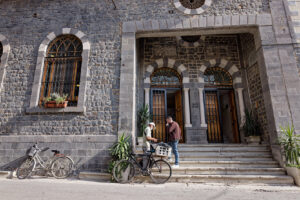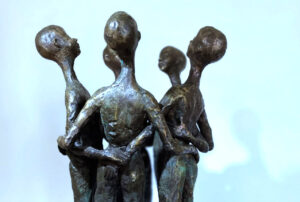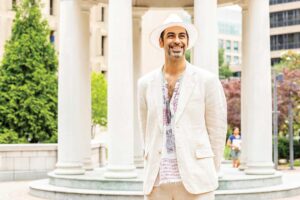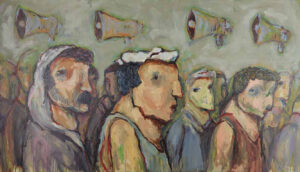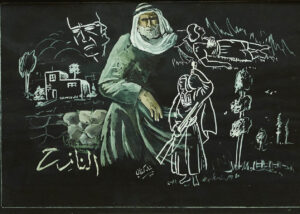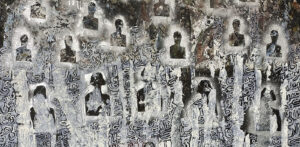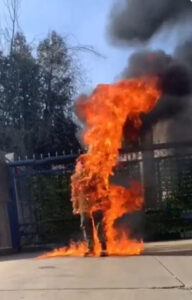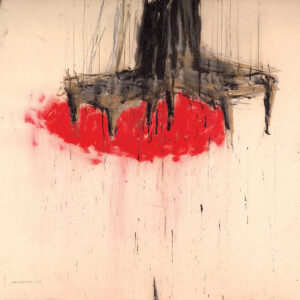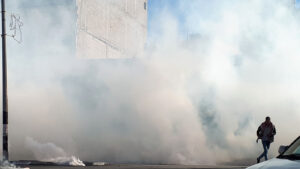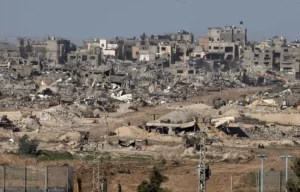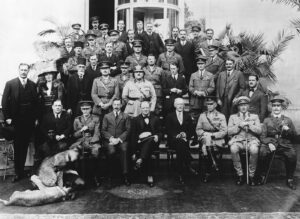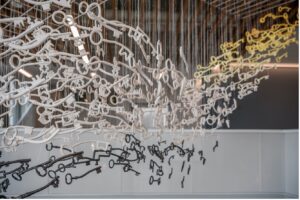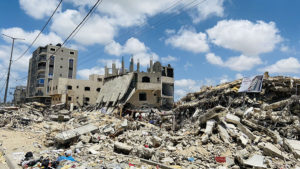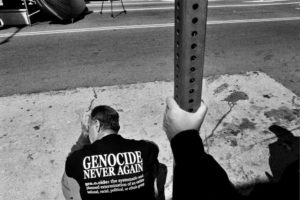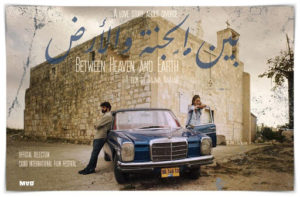The genocide in Gaza portends the emergence of a dystopian world where the industrialized violence of the Global North is used to sustain its hoarding of diminishing resources and wealth.
Gaza is a wasteland of 50 million tons of rubble and debris. Rats and dogs scavenge amid the ruins and fetid pools of raw sewage. The putrid stench and contamination of decaying corpses rises from beneath the mountains of shattered concrete. There is no clean water. Little food. A severe shortage of medical services and hardly any habitable shelters. Palestinians risk death from unexploded ordnance, left behind after over 15 months of air strikes, artillery barrages, missile strikes and blasts from tank shells, and a variety of toxic substances, including pools of raw sewage and asbestos.
Hepatitis A, caused by drinking contaminated water, is rampant, as are respiratory ailments, scabies, malnutrition, starvation and the widespread nausea and vomiting caused by eating rancid food. The vulnerable, including infants and the elderly, along with the sick, face a death sentence. Some 1.9 million people have been displaced, amounting to 90 percent of the population. They live in makeshift tents, encamped amid slabs of concrete or the open air. Many have been forced to move over a dozen times. Nine in 10 homes have been destroyed or damaged. Apartment blocks, schools, hospitals, bakeries, mosques, universities — Israel blew up Israa University in Gaza City in a controlled demolition — cemeteries, shops and offices have been obliterated. The unemployment rate is 80 percent and the gross domestic product has been reduced by almost 85 percent, according to an October 2024 report issued by the International Labor Organization.
Israel’s banning of the United Nations Relief and Works Agency for Palestine Refugees in the Near East — which estimates that clearing Gaza of the rubble left behind will take 15 years — ensures that Palestinians in Gaza will never have access to basic humanitarian supplies, adequate food and services.
The United Nations Development Programme estimates that it will cost between $40 billion and $50 billion to rebuild Gaza and will take, if the funds are made available, until 2040. It would be the largest post-war reconstruction effort since the end of World War Two.
Israel, supplied with billions of dollars of weapons from the U.S. Germany, Italy and the U.K., created this hell. It intends to maintain it. Gaza is to remain under siege. After an initial burst of aid deliveries at the start of the ceasefire, Israel has once again severely cut back the trucked-in assistance. Gaza’s infrastructure will not be restored. Its basic services, including water treatment plants, electricity and sewer lines, will not be repaired. Its destroyed roads, bridges and farms will not be rebuilt. Desperate Palestinians will be forced to choose between living like cave dwellers, camped out amid jagged chunks of concrete, dying from disease, famine, bombs and bullets, or permanent exile. These are the only options Israel offers.
Israel is convinced, probably correctly, that eventually life in the coastal strip will become so onerous and difficult, especially as Israel finds excuses to violate the ceasefire and resume armed assaults on the Palestinian population, a mass exodus will be inevitable. It has refused, even with the ceasefire in place, to permit foreign press into Gaza, a ban designed to blunt coverage of the horrendous suffering and death.
Donald Trump, in a meeting at the White House with Israeli Prime Minister Benjamin Netanyahu, made it clear Gaza will not be rebuilt, at least not for the Palestinians. He made it clear Gaza was meant from the start of the genocide to be bombed into rubble, meant to be made uninhabitable and meant to be depopulated of the Palestinians. The problem, for Trump and Netanyahu, is not the Israeli occupiers but the occupied. And once the Palestinians are gone, once they are forced into Jordan or Egypt or some other country, once the “problem” is solved Trump, who described Gaza as a “phenomenal location” on the sea with its “best weather” will become, in their eyes, a seaside resort for wealthy tourists, a playground for those whose nations orchestrated the mass slaughter.
Stage Two of Israel’s genocide and the expansion of “Greater Israel” — which includes the seizing of more Syrian territory in the Golan Heights (as well as calls for expansion to Damascus), southern Lebanon, Gaza and the occupied West Bank — is being cemented into place. Israeli organizations, including the far right Nachala organization, have held conferences to prepare for Jewish colonization of Gaza once Palestinians are ethnically-cleansed. Jewish-only colonies existed in Gaza for 38 years until they were dismantled in 2005.
Washington and its allies in Europe do nothing to halt the live-streamed mass slaughter. They will do nothing to halt the wasting away of Palestinians in Gaza from hunger and disease and their eventual depopulation. They are partners in this genocide. They will remain partners until the genocide reaches its grim conclusion.
But the genocide in Gaza is only the start. The world is breaking down under the onslaught of the climate crisis, which is triggering mass migrations, failed states and catastrophic wildfires, hurricanes, storms, flooding and droughts. As global stability unravels, the terrifying machine of industrial violence, which is decimating the Palestinians, will become ubiquitous. These assaults will be committed, as they are in Gaza, in the name of progress, Western civilization and our supposed “virtues” to crush the aspirations of those, mostly poor people of color, who have been dehumanized and dismissed as human animals.
Israel’s annihilation of Gaza marks the death of a global order guided by internationally agreed upon laws and rules, one often violated by the U.S. in its imperial wars in Vietnam, Iraq and Afghanistan, but one that was at least acknowledged as a utopian vision. The U.S. and its Western allies not only supply the weaponry to sustain the genocide, but obstruct the demand by most nations for an adherence to humanitarian law.
The message this sends is clear: You, and the rules that you thought might protect you, do not matter. We have everything. If you try and take it away from us we will kill you.
The militarized drones, helicopter gunships, walls and barriers, checkpoints, coils of concertina wire, watch towers, detention centers, deportations, brutality and torture, denial of entry visas, apartheid existence that comes with being undocumented, loss of individual rights and electronic surveillance are as familiar to the desperate migrants along the Mexican border or attempting to enter Europe as they are to the Palestinians.
Israel, which as Ronen Bergman notes in “Rise and Kill First” has “assassinated more people than any other country in the Western world,” uses the Nazi Holocaust to sanctify its hereditary victimhood and justify its settler-colonial state, apartheid, campaigns of mass murder and Zionist version of Lebensraum.
Primo Levi, who survived Auschwitz, saw the Shoah, for this reason, as “an inexhaustible source of evil” which “is perpetrated as hatred in the survivors, and springs up in a thousand ways, against the very will of all, as a thirst for revenge, as moral breakdown, as negation, as weariness, as resignation.”
Genocide and mass extermination are not the exclusive domain of fascist Germany. Adolf Hitler, as Aimé Césaire writes in “Discourse on Colonialism”, appeared exceptionally cruel only because he presided over “the humiliation of the white man.” But the Nazis, he writes, had simply applied “colonialist procedures which until then had been reserved exclusively for the Arabs of Algeria, the coolies of India, and the blacks of Africa.”
The German slaughter of the Herero and Namaqua (1904-1908), the Armenian genocide of 1915, the Bengal famine of 1943 — then British Prime Minister Winston Churchill airily dismissed the deaths of three million Hindus in the famine by calling them “a beastly people with a beastly religion” — along with the dropping of nuclear bombs on the civilian targets of Hiroshima and Nagasaki, illustrate something fundamental about “western civilization.” As Hannah Arendt understood, antisemitism alone did not lead to the Shoah. It needed the innate genocidal potential of the modern bureaucratic state.
“In America,” the poet Langston Hughes said, “Negros do not have to be told what fascism is in action. We know. Its theories of Nordic supremacy and economic suppression have long been realities to us.”
We dominate the globe not because of our superior virtues, but because we are the most efficient killers on the planet. The millions of victims of racist imperial projects in countries such as Mexico, China, India, the Congo, Kenya and Vietnam are deaf to the fatuous claims by Jews that their victimhood is unique. So are Black, Brown and Native Americans. They also suffered holocausts, but these holocausts remain minimised or unacknowledged by their western perpetrators.
“These events which took place in living memory undermined the basic assumption of both religious traditions and the secular Enlightenment: that human beings have a fundamentally ‘moral’ nature,” Pankaj Mishra writes in his book “The World After Gaza.” “The corrosive suspicion that they don’t is now widespread. Many more people have closely witnessed death and mutilation, under regimes of callousness, timidity and censorship; they recognise with a shock that everything is possible, remembering past atrocities is no guarantee against repeating them in the present, and the foundations of international law and morality are not secure at all.”
Mass slaughter is as integral to western imperialism as the Shoah. They are fed by the same disease of white supremacy and the conviction that a better world is built upon the subjugation and eradication of the “lower” races.
Israel embodies the ethnonationalist state the far-right in the U.S. and Europe dreams of creating for themselves, one that rejects political and cultural pluralism, as well as legal, diplomatic and ethical norms. Israel is admired by these proto-fascists, including Christian nationalists, because it has turned its back on humanitarian law to use indiscriminate lethal force to “cleanse” its society of those condemned as human contaminants.
Israel and its western allies, James Baldwin saw, is headed towards the “terrible probability” that the dominant nations “struggling to hold on to what they have stolen from their captives, and unable to look into their mirror, will precipitate a chaos throughout the world which, if it does not bring life on this planet to an end, will bring about a racial war such as the world has never seen.”
What is lacking is not knowledge — our perfidy and Israel’s is part of the historical record — but the courage to name our darkness and repent. This willful blindness and historical amnesia, this refusal to be accountable to the rule of law, this belief that we have a right to use industrial violence to exert our will marks the start, not the end, of campaigns of mass slaughter by the Global North against the world’s growing legions of the poor and the vulnerable.





